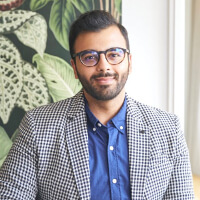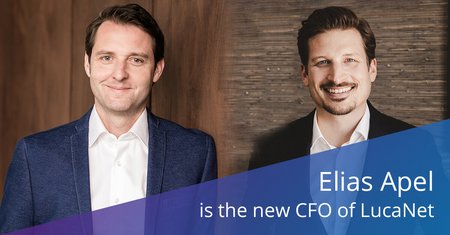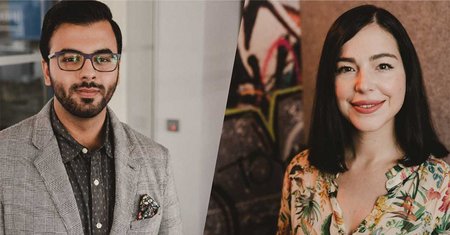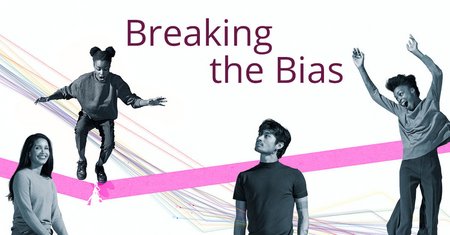Diversity and Inclusion in Finance: Shared values at LucaNet
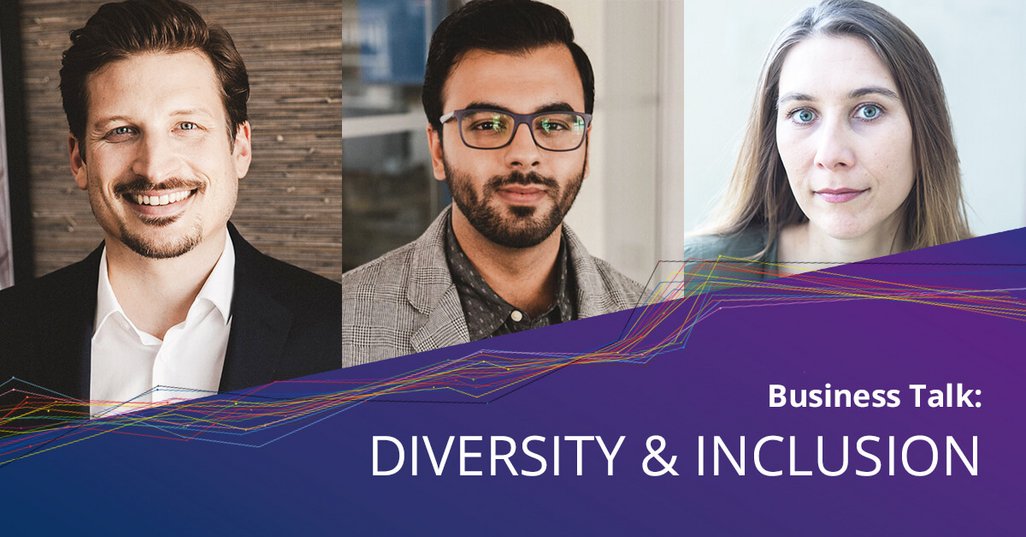
Diversity and inclusion are two of the big topics of our time. However, these topics do not only have an important impact on society and politics, but also the business world. Unfortunately, there is a lack of concrete implementation, especially in the financial sector. Two studies that were recently published in Forbes magazine show that 60% of employees in the financial industry perceive their working environment as non-inclusive and 42% of female respondents have left a job due to a lack of inclusion in the past.
At LucaNet, we want to actively contribute to the change towards a more inclusive working environment. We attach great importance to a corporate culture that really enables inclusion. With our recently published Diversity & Inclusion Mission, we have now set the direction for the LucaNet Group. In an interview with media professional and translator Annika Erichsen, LucaNet board member and CFO Elias Apel and Senior Organizational Development Manager Sabeel Asghar reveal what our plans are concerning this topic and why D&I is also an absolute must from a business perspective:
Annika: Hello to both of you! Thank you for taking the time for this interview. You both made it clear in advance that the topic is really important to you and LucaNet. D&I are also very central topics for me − personally and professionally. In the media world, I have repeatedly experienced that I, as a woman, was trusted less than men with comparable or even less experience. As a translator, I deal with gender-equitable language intensively, and through my life partner with BIPoC migration history and our daughter, I also have a very personal connection to the topic of cultural and ethnic diversity. So, let's start with the question of what D&I mean to you both:
What exactly do the concepts of "diversity" and "inclusion" stand for?
Sabeel: To me, diversity and inclusion are closely related, but not interchangeable. Diversity − in all its facets − is what makes inclusion possible in the first place: diversity focuses on the composition of a unit; inclusion, on the other hand, means integrating the contributions, presence, and perspectives of different groups and individuals as valuable elements in a working environment. I think that it is quite important to understand this difference!
I firmly believe that we can only develop our full potential if we are in an environment where every person is valued with their own unique characteristics and differences are accepted. That's why I also see D&I as something that companies can't afford to ignore these days: globalization is real, it is really happening! If you want to be innovative and dynamic, you have to think about hearts and minds of different age, gender, sexual orientation and identity, social origin, disability (physical or cognitive), religion, and ethnic background. Most people no longer stay in one place for their entire lives. In order for us to bring out the best in a new culture, in another country, or even where we come from, to be able to fully develop, we need to feel respected − exactly the way we are. At work, as part of society, in our circle of friends, in our family.
Elias: This is a really important topic for me − socially speaking, but also as a member of an international company like LucaNet. Among other things, I'm responsible for global growth and work with people from various countries and cultures. So, I have to know and − more importantly − understand their needs and wishes. To ensure our growth, as an employer we must simply be attractive to everyone. We have to design a working environment that makes everyone feel comfortable.
I myself was lucky enough to grow up in a family that allowed me to understand what D&I meant at an early age. That made me the person I am today. And I am very happy about and grateful for that! That's why I'd also like to pass this on in our company and, for example, open up the opportunity for younger employees to have similar experiences. I am firmly convinced that LucaNet can be a real pioneer in the financial world concerning this topic by setting a good example.
An inclusive working environment promotes one's own potential
Annika: Elias, you said that you already experienced D&I in your childhood. When did you first come into contact with the topic?
Elias: I lived abroad as a child, in several countries. And then at school I was just “the German”. In France, for example, my siblings and I were greeted with a Hitler salute and called "Boche" [a derogatory term for Germans, especially during the First and Second World Wars, editor's note]. The other children didn't mean any harm, it was funny to them. After all, these were not their own ideas at all, but those of their grandparents. That was clear to me, and that's why it wasn't so bad for me, but my younger siblings didn't know where it came from or what it meant. I had to explain it to them and that was hard for me! I therefore learned how much exclusion and discrimination can hurt and how important it is to talk about it at a young age.
Sabeel: I can very well relate to what Elias is describing. I was also lucky enough to grow up on 4 continents. I'm what's known as a third culture kid, which means I didn't grow up in my parents' culture. And during my time at school and university, I noticed that I performed best in countries where diversity and Inclusion was embraced and where I felt accepted as an individual. There were also times when my performance level dropped, and I wasn't really doing well − and that was always when I felt like I wasn't allowed to be myself.
Part of my childhood was also experiencing my mother working with children with special needs. After school, I would go visit my mom and observe her and her students. Those times also gave me a very early exposure to people with disabilities and our role to dispel myths and create an ecosystem to integrate them more.
Annika: Interesting, I myself grew up in Germany, but have been living in France for several years. Fortunately, my experiences are not similar to Elias', but I do notice that nationality often plays a role and especially that I, as a German, or European, white foreigner, am treated quite differently than non-white people with a non-European migration history.
So, when we look at the work context, this brings me to an American study that showed that diverse companies and teams, understand the unmet needs of their customers better. If at least one team member shared their customer’s ethnicity, the entire team is 152% likelier to understand this customer. What do you think are the reasons why D&I is so important for companies? so important for companies?
19 % more innovation revenue and increased attractiveness for companies
Sabeel: Yes, we should definitely talk about the why! A company's first task is always to meet the needs of the market. Of course, innovation plays a major role here, because demand is constantly changing. And this is where many companies have failed in the past because they have made little effort to be innovative. They just kept producing the same products.
However, market processes have become so dynamic in the globalized world that they have to keep increasing our innovation potential. Diversity unlocks innovation because it creates an environment where “outside the box” is an accepted norm. The greater a company's D&I factor, the higher its innovation potential and thus its prospects for success. A study by the Boston Consulting Group, for example, showed that companies with an above-average diversity factor generate 19% more revenue through innovation than average companies do in this respect. Despite this, 40% of US-American companies still do not have a dedicated D&I budget.
Elias: I can only agree with Sabeel. Without a D&I strategy that is actually implemented, a company is not attractive for top employees. It runs the risk of no longer being able to meet customer requirements and of failing to keep pace with market developments. We therefore have to constantly reinvent ourselves. Ultimately, success has a lot to do with resilience, and we are only resilient if we are innovative. And we are only innovative if we have the right people in our team and work together, if we promote loyalty amongst our employees, e.g., by sharing common purpose. This does not only have to do with figures and statistics, but with the values that our corporate culture is based on; of course, this applies just as much to sustainability, environmental compatibility, or work-life balance.
Investment in diversity and inclusion pays off in the long run
Annika: Elias, you said that it's about much more than just numbers. But still, what about the financial aspect?
Elias: There are enough studies to prove that among the top companies, those with a significant D&I culture outperform the others. McKinsey, for example, has presented figures according to which cultural and ethnic diversity increases the probability factor for a company's above-average success by 36%, and a high proportion of women by as much as 46%! However, I don't think the impact of D&I can always be mapped in a 1:1 ratio. Perhaps the finance industry is struggling to implement more D&I precisely because most finance people are so number-obsessed and cling to KPIs and statistics.
You have to understand that this is primarily about how we define and position ourselves, how we are perceived as a company, which in turn affects who applies to work for us. And financial success is the final outcome. But that also means that the corporate culture and the working environment we create come first.
Annika: If we can't talk about a 1:1 ratio here, how can the impact of D&I be measured?
Elias: Measuring the impact of D&I can differ from business to business and the industry the organization operates within. The core for any business is to understand their D&I goals and the local context. The local context is the unique legal, historical, political, and cultural environments of different nations and regions that determine which diversity issues are relevant.
While these perspectives differ in many ways, in general, a diverse and inclusive culture will always show a positive impact on job retention, the employee engagement score, eNPS, and gender split, increment the number of diverse employees, and depending on how an organization shapes their engagement surveys, that too is a good source of measuring the impact of D&I.
Sabeel: What Elias is saying is quite right. The success for this kind of investment is only noticeable in the long run. I would add that our partner and customer companies are also paying more and more attention to these issues. And it's important to remember that by 2025, 75% of the workforce will be made up of Millennials, who care much more about diversity and inclusion than previous generations. There is a very interesting Deloitte study on this.
LucaNet’s Diversity & Inclusion Mission
Annika: All well and good, but what does that mean in concrete terms? How can D&I be implemented in a company?
Sabeel: At LucaNet we have decided on a set of initiatives to drive D&I as an essential pillar within the business context and for our organization. Just to name two:
- With the goal to be able to express ourselves to others more inclusively, we are fostering gender-neutral language within our internal and external communication channel. For that we have created a training and guideline that enable our employees to upskill themselves to use gender-neutral language in various languages.
- One other goal is to increase the proportion of women in certain departments and promoting the exchange about their experience and challenges in business life. The Women@LucaNet initiative was created already last year to promote empowerment through networking and mutual support.
With these initiatives we want to work towards our main goal of making our working environment even more inclusive. We want everyone at LucaNet to feel perceived and valued in their uniqueness. We want to encourage and reward inclusive behavior. My personal goal is that everyone who works here feels like LucaNet is a safe space, regardless of age, gender, sexual orientation and identity, social origin, disability (physical or cognitive), religion, and ethnic background. I see this as a social and societal responsibility that we have as a company. And I very much hope that this will make us pioneers in the financial world, leading by example. As Elias has already said, we want to drive inclusion through exemplary action and question and overcome entrenched thought patterns.
Who is responsible for diversity and inclusion?
Annika: The financial industry is a particularly male-dominated working environment, especially at management levels. Elias, in your role as CFO and board member, do you see yourself as having the responsibility to advocate for more D&I?
Elias: My responsibility in this area does not only depend on my title. It has always been important to me to set a good example, and not just in terms of equality between men and women. When selecting applicants, for example, it is simply part of my job to take diversity into account in every respect. These are basic principles that I have set myself and in which I see potential for added value and innovation. And thus, ultimately, for success and productivity. I have had my own team at LucaNet since 2019 and can already confirm positive effects here.
As CFO, I naturally have a responsibility to drive this even further, to break down unconscious thought patterns and to define D&I goals for the entire company. We understand this as a responsibility for our entire global leadership team in addition to driving and acquiring D&I but at the same time continuously working towards establishing a culture in which all employees feel safe and free to contribute ideas.
Sabeel: We work with over 100 partner companies worldwide, and the number is growing. LucaNet is at the center of this ecosystem, is the common denominator of these companies, so to speak. And of course, we have a responsibility for the quality of our products and services, but we also have a responsibility to clearly state what we stand for, how we would like to shape our shared working environment, what kind of growth we would like to see, what values are important to us. We want to be a recognizable and proactive leader for D&I within this ecosystem and beyond.
Vita
Elias was born in Freiburg im Breisgau and partially grew up in Paris. He studied business administration in Freiberg, Ingolstadt, and Nice. After more than 10 years of experience in M&A and corporate finance consulting, he joined LucaNet in 2018 to lead the global partner business expansion and shortly afterwards became responsible for the overall international expansion. Today, besides heading the finance department as CFO, Elias is also responsible for International Operations, Business Development, and Channel. Elias is an absolute family person, a DIY enthusiast, a passionate cook, and most recently became a cycling fanatic.
Vita
Sabeel is a third culture kid who is a telecommunication engineer turned into a business engineer. He studied at HTW Berlin and Harvard Business School in Boston. He is a facilitator by day, goal-digger by choice, and strategic thinker by fate. At LucaNet, he uses these skills and traits to create and implement business strategies as well as initiate and manage transformation projects. When he is not working, he enjoys cooking for his friends and family, travelling when possible, and reading with a nicely brewed coffee.


